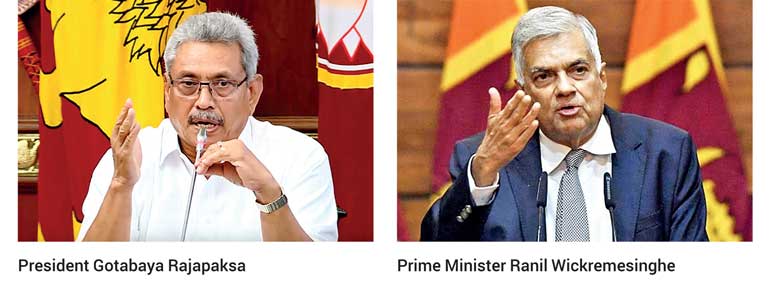Sunday Feb 15, 2026
Sunday Feb 15, 2026
Tuesday, 12 July 2022 00:58 - - {{hitsCtrl.values.hits}}

The Speaker of Parliament announced to the nation on Saturday night that President Gotabaya Rajapaksa had informed him that he would be resigning from office on Wednesday 13 July. Following a meeting with party leaders held earlier that day at his official residence, the following course of action was announced:
a) The President and the Prime Minister will both resign on Wednesday 13 July.
b) The Parliament will elect one of its members as the new President.
c) The Speaker will serve as Acting President until the new President assumes office.
d) An All-Party Government will be formed under a new Prime Minister.
This proposed course of action could lead to serious detrimental consequences in the governance of the country at this critical stage in the lives of its people.
Constitutional provisions
The Constitution states that if the office of President becomes vacant prior to the expiration of his term of office, whether by resignation or otherwise, the following steps should immediately be taken:
i. Parliament shall elect one of its members to serve as President for the unexpired period of the President vacating office.
ii. Such election shall be held as soon as possible after, and in any case no later than one month from, the date of occurrence of the vacancy.
iii. The election shall be by secret ballot and by an absolute majority of the votes cast.
iv. During the period between the occurrence of the vacancy and the assumption of office by the new President, the Prime Minister shall act in the office of President and shall appoint one of the Ministers to act in the office of Prime Minister. However, if the office of Prime Minister is vacant or the Prime Minister is unable to act, the Speaker shall act in the office of President.
Under the Constitution, upon the Prime Minister ceasing to hold office by resignation of otherwise, the Cabinet of Ministers stands dissolved (Art.49). Upon the dissolution of the Cabinet of Ministers, the Secretaries to Ministries cease to hold office (Art.52). Since the number of Ministries and the subjects to be assigned to such Ministries is determined by the President in consultation with the new Prime Minister (Art.44), the Ministries too, presumably cease to exist and departmental heads assume sole responsibility.
Simultaneous resignations
The party leaders appear to have decided that the President and the Prime Minister should both resign on 13 July. How is that to be done? The Constitution states that the Prime Minister resigns his office “by a writing under his hand addressed to the President” (Art.47). The President resigns his office “by a writing under his hand addressed to the Speaker” (Art.38). If the Prime Minister’s resignation letter is received by the President before his own letter is received by the Speaker, the President is still in office and is obliged to appoint a new Prime Minister. If, on the other hand, the Speaker has already received the President’s resignation letter before the President receives the Prime Minister’s letter, the latter would be obliged, instead of attempting to resign, to take his oath of office before the Chief Justice as Acting President (Art.40). The absurdity of this requirement of party leaders, apparently made with no consideration of the Constitution – the supreme law – requires no further comment.
Resignation of the Prime Minister
If the President and the Prime Minister were to succeed in resigning at a pre-arranged exact moment on 13 July, and the Speaker were to be sworn in as Acting President, the country would be faced with an anarchic situation where there would be no Ministers, no Secretaries and no Ministries. The Speaker (as Acting President) could, of course, appoint a new Prime Minister, determine the number of Ministries in consultation with that new Prime Minister, and appoint new Ministers and new Secretaries. However, since the election of the new President by Parliament has to occur “as soon as possible”, this new government of the Speaker in his capacity as Acting President may have a lifespan of only a week or two and will be immediately replaced by a new government appointed by the new President.
Critical issues affecting the life of the country
According to Prime Minister Ranil Wickremesinghe, “The island-wide fuel distribution is due to recommence this week, the World Food Programme Director is due to visit the country this week, and the Debt Sustainability Report for the IMF is due to be finalised shortly.” If that be so, is this the appropriate week for the Prime Minister to resign, leaving unresolved the critical issues that affect the lives of people which require urgent attention, and thereby cause the immediate collapse of the government leaving no Ministers or Secretaries, including the Secretary to the Treasury? Would not the sensible course be for the Prime Minister to remain in office (as Acting President and Head of the Government) until Parliament elects a new President and he or she proceeds to constitute the so-called and hitherto unattainable “All Party Government”?